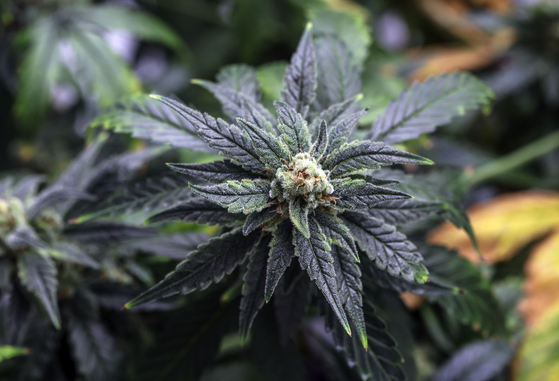A cannabis plant ready to be harvested for cannabidiol (CBD) is seen on July 21, 2022. [JOONGANG ILBO]
If a product made from the cannabis stem or roots carries the same substances contained in its leaves, then the product is illegal, the Supreme Court of Korea says.
The court said on Monday that it overturned and remanded a lower court’s decision on May 29. The ruling was regarding a cosmetics ingredient importer that filed a lawsuit after it was denied permission to import cannabidiol (CBD), a substance derived from cannabis, in 2020. Authorities had deemed the substance a narcotic.
The plaintiff argued that the substance in question was not cannabis as defined under the Narcotics Control Act.
Cannabis includes cannabis plants and their resin, all products manufactured using these as raw materials, chemically synthesized substances with the same composition as cannabis designated by presidential decree or any mixture or preparation containing the substances, according to Article 2, Clause 4 of the Narcotics Control Act.
However, the law also includes an exception for seeds, roots and the mature stems of cannabis and products made from them.
This exception exists because the main hallucinogenic compounds are concentrated in the unmodified female flowers of the plant, while the excepted parts are typically used for fiber or edible seeds.
The Supreme Court building in Seocho District, southern Seoul, is seen on June 9. [NEWS1]
Citing this, the plaintiff claimed the substance could be considered as extracted from a part of the cannabis plant that is excepted from the law, and should not be classified as illegal.
Both the district and appellate courts accepted this argument.
“Tetrahydrocannabinol [THC], the main hallucinogenic compound, was not detected in the imported substance, and it could not be definitively concluded that the exception clause did not apply,” the lower courts said, thus deeming the import ban unlawful.
However, the Supreme Court found otherwise, saying the classification should be based on the substance itself.
The court noted that substances derived from cannabis are generally known as cannabinoids, and the Enforcement Decree of the Narcotics Control Act specifies that synthetic compounds chemically identical to cannabis components — including cannabinol (CBN), THC and CBD, along with their salts and isomers — must be regulated.
In this April 12, 2018, photo, a marijuana plant awaits transplanting at the Hollingsworth Cannabis Company near Shelton, Washington. [AP/YONHAP]
“The Narcotics Control Act considers CBN, THC and CBD as primary cannabis-derived components that may pose health risks due to misuse, and includes both natural and synthetic versions of these compounds in its regulations,” the Supreme Court said. “Therefore, the substance in this case, CBD, constitutes cannabis.”
This is the first Supreme Court ruling on synthetic cannabis components extracted from parts of the plant considered exceptions under the law.
“While the law includes exceptions for parts of the cannabis plant with low abuse potential and higher applicability for fiber and seed use, it does not intend to exclude substances that extract major cannabis components like CBD from regulation,” the court said. “Any such exclusion would go against the purpose of the Narcotics Control Act, which is to prevent health hazards from cannabis abuse.”
The plaintiff also argued that CBD should be removed from the list of narcotics due to its medical and commercial value, but the court responded that “such matters should be addressed through legislation, not judicial interpretation under the current Narcotics Control Act.”
Translated from the JoongAng Ilbo using generative AI and edited by Korea JoongAng Daily staff.
BY KIM JEONG-YEON [[email protected]]
If a product made from the cannabis stem or roots carries the same substances contained in its leaves, then the product is illegal, the Supreme Court of Korea says. Read More


